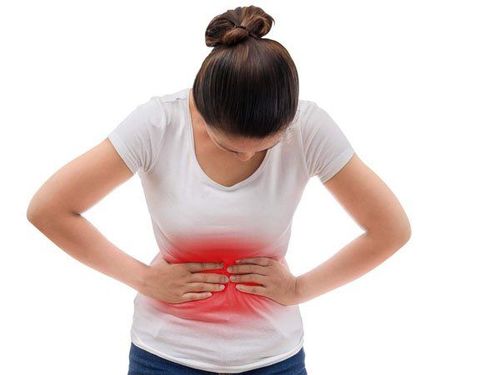This is an automatically translated article.
The article is professionally consulted by Master, Doctor Dinh Thanh Ha - Obstetrician and Gynecologist - Department of Obstetrics and Gynecology, Vinmec Nha Trang International HospitalDuring puberty, the body begins to change and become more like an adult. One of those changes is the appearance of the first menstrual cycle. In women, most start menstruating between the ages of 12 and 14, but in some cases, they start earlier or later.
1. What is the menstrual cycle?
At the onset of puberty, the brain sends out signals for the body to produce hormones. Among those hormones, there are hormones that prepare a woman's body each month when conception can occur. This process is called the menstrual cycle.
This hormone causes the lining of the uterus to become thicker, containing more blood vessels and tissues. One of the ovaries releases an egg, which is called ovulation. After ovulation, the egg travels down the fallopian tube towards the uterus to implant.
Pregnancy will not happen, if the egg is not fertilized with sperm (sperm produced in the male body) at this time, the lining of the uterus will shed and flow out of the body through through the vagina. Menstruation is the shedding of blood and tissue from the lining of the uterus.
Trắc nghiệm: Bạn có hiểu đúng về dấu hiệu mang thai sớm?
Các dấu hiệu mang thai sớm không phải chỉ mỗi trễ kinh mà còn có rất nhiều dấu hiệu khác như xuất huyết âm đạo, ngực căng tức,… Điểm xem bạn biết được bao nhiêu dấu hiệu mang thai sớm thông qua bài trắc nghiệm này nhé!
2. How long is normal to have a period?
The first period will only last for a few days. The first menstrual periods can be very light, sometimes only a few reddish brown spots of blood. However, later times may be longer and more frequent. It is normal to have a period lasting 2-7 days.
3. How long is the menstrual cycle?
A menstrual cycle will be counted from the first day of bleeding in one month to the first day of bleeding in the following month. So how long is the menstrual cycle? An average menstrual cycle lasts about 28 days, but for some people, a menstrual cycle of 21-45 days is also normal. From your first period, it can take up to 6 years or more to have regular periods.

4. Menstrual cycle time tracking
Menstrual cycle tracker can make it easier to predict when you will have your period next month and when you will be able to conceive. To track your menstrual cycle, you can download applications available on the internet or on your phone.
5. How to track your menstrual cycle on a calendar
To track your menstrual cycle on the calendar, it is necessary to mark the first day of bleeding on the calendar and also the following days during the period of still bleeding. The first day of menstruation is first marked as day 1. Then continue to each day until the next menstrual period.
Personal care products during menstruation
Tampons: a piece of underwear that is used to absorb menstrual blood. Tampons come in a variety of sizes, thicknesses, and designs. Change tampons at least every 4 hours or whenever it feels too wet or feels wet and uncomfortable. Tampon: A plastic or paper tube that makes it easier for the tampon to slide into place. Some models do not have this device and are inserted with the finger. Tampons have a short cord attached to the end that comes out of the vagina to make it easy for the user to remove. Tampons need to be changed at least every 4 hours. Because if you leave tampons in the vagina for a long time, it can be associated with toxic shock syndrome. Change often when you see a lot of bleeding Menstrual cups: made of plastic or rubber. The menstrual cup is inserted into the vagina to catch the menstrual flow. The cup can be removed and cleaned after 8 to 12 hours. Some menstrual cups can only be used once and then thrown away, while others can be washed and reused.
6. What is amenorrhea?
Amenorrhea means no period. It will be normal for some people to not have their period until the age of 16. However, you should see your doctor when you are over 15 years old and still have not seen your period. You should also see your doctor if you've started your period but haven't had a period for more than 3 months.
7. Does menstruation cause abdominal pain or discomfort?

In some people, when they get their period, they often experience cramping pain in the lower abdomen or feel back pain, chest tightness. Some experience headaches, dizziness, nausea or diarrhea. To relieve symptoms of menstrual pain or discomfort, you can apply the following ways:
Use dydrogesterone as prescribed by your doctor. The drug does not inhibit ovulation, women can become pregnant during the use of the drug. Take ibuprofen or naproxen sodium (if you are not allergic to aspirin or have severe asthma). Always follow the directions and directions on the bottle for dosage. Gentle exercise. Apply warm water or other sources of heat to your abdomen or lower back to relieve colic pain.
8. What to do if heavy bleeding occurs?
If you're bleeding heavily, need to change pads or tampons every 1-2 hours, or if your period lasts longer than 7 days, see your doctor. You should also seek medical attention right away if you feel dizzy, light-headed, or have a rapid pulse.9. What to do if your period is irregular?
You should tell your doctor if your periods are irregular, or your periods are regular but then become irregular for several months. You should also see your doctor if your periods are more frequent (≤ 21 days) or less frequent (≥ 45 days).
If you have irregular menstrual cycles, you need to be treated before you want to have a baby. To prepare for a healthy pregnancy, both husband and wife should have a reproductive health checkup 3-5 months before becoming pregnant.
The wife should:
Get vaccinated before pregnancy (especially against rubella because rubella in pregnancy is extremely dangerous ) Genetic testing to screen for genetic diseases before pregnancy Check for secondary infections In particular, women over 35 years of age, if they want to become pregnant (especially if they have never been pregnant), will have to have a very detailed health check because pregnancy at this age often problems: Ovarian failure, premature birth, higher risk of birth defects, placenta previa, preeclampsia. The husband should:
Check reproductive health, detect diseases of testicular atrophy, physiological weakness, weak sperm... Sexually transmitted diseases, especially those that cannot be cured, are extremely dangerous. Vinmec currently has many comprehensive health care programs for couples, pregnant mothers and their unborn babies, including basic pre-marital examination packages, advanced pre-marital examination packages, and maternity packages. . Vinmec has a team of experienced doctors in the fields of obstetrics and gynecology, IVF, stem cells, gene technology, capable of synchronously and comprehensively deploying the most advanced assisted reproductive techniques today.
Please dial HOTLINE for more information or register for an appointment HERE. Download MyVinmec app to make appointments faster and to manage your bookings easily.














